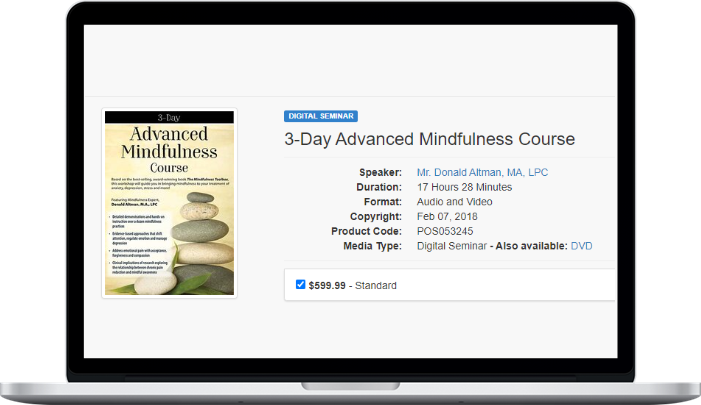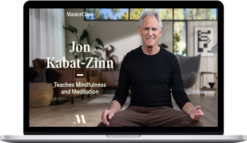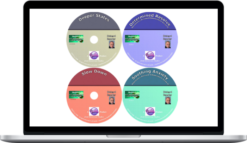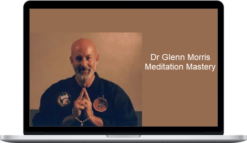Donald Altman – 3-Day Advanced Mindfulness Course
$599.99 $50.00
Total Sold: 3
»Instant Delivery
Description
Donald Altman – 3-Day Advanced Mindfulness Course
Description of 3-Day Advanced Mindfulness Course
- Detailed demonstrations and hands-on instruction in over a dozen mindfulness practices
- Evidence-based approaches that shift attention, regulate emotion, and manage depression
- Address emotional pain with acceptance, forgiveness, and compassion
- Manage moods with interventions that impact clients’ attention
- Clinical implications of research exploring the relationship between chronic pain reduction and mindful awareness
In this comprehensive course, international mindfulness teacher and best-selling author Donald Altman will share powerful clinical tools that will help you create a clear roadmap to wellness. From grounding and attention-focusing skills to metacognitive awareness, Donald will deliver detailed demonstrations and instruction on over a dozen mindfulness practices you can use to improve treatment outcomes.
Best of all, you will learn to embody mindfulness as you help your clients overcome clinical anxiety, depression, chronic pain, PTSD, addictive cravings, and stress related symptoms!
Watch Donald and learn to:
- Alter clients’ habitual and conditioned reactions to anxiety, chronic pain, and depression with practical evidence-based mindfulness techniques
- Apply mindfulness to pain and improve mental and physical functioning in your clients
- Reduce anxiety by mindfully managing transitions through movement
- Creatively adapt your newfound mindfulness tools to work with a variety of client populations
Donald is known for his compelling and entertaining presentations, and this recording will get you excited about using mindfulness with your clients. Return to your practice with a wide range of tools to use in your next session!
What you’ll learn in 3-Day Advanced Mindfulness Course
Mindfulness and Cutting Edge Research
- Mindfulness as a metacognitive skill
- Negative effects of a wandering mind
- Breathing reduces rumination and anxiety
- Useful (and free) web resources
Introduce Mindfulness to Your Clients
- Expand your mindfulness vocabulary
- Help clients understand mindfulness
- Find the right metaphor
- Using clients’ learning styles
- Practice: Getting into the Present Moment
The Power of Sense Grounding
- Anxiety reduction with sense grounding
- Mindfulness for transitioning between activities
- Physical grounding method of dropping into the body
- Integrate progressive muscle relaxation
- Good for spatial, visual, hands-on learning styles
- Practice: Palm the Present Moment
Brain Basics, Metacognition, and Interpersonal
- Neurobiology
- Emotional regulation for depression and anxiety
- Balance the brain’s default survival mode
- Effects of cortisol on learning and immune system
- Visual Brain Model for clients
- The brain’s mindfulness module
- Train the brain for calm response and metacognition
- Navy Seals, arousal control & parasympathetic nervous system
- Heart rate variability & relaxation response
- Practice: The Power of Breath
- Practice: Ask Clients the 3-Minute Question
The Behavioral Side of Mindfulness
- Core lifestyle skills awareness training
- Sleep hygiene
- Manage sleep
- Sleep rituals and strategies
- Healthy eating/nutrition
- Caffeine, protein, neurotransmitters, and the brain
- Exercise
- Manage technology – How weapons of mass distraction may be rewiring the brain
- Practice: Assessment of Technology and Time
- Focus the mind (useful for ADHD)
- Integrate breath with a word/image
- Practice: Be the Pebble
Mindful Laughter for Depression and Grief
- Tools for the ”terminally serious”
- Research on laughter and mood
- Biochemistry of laughter & human laughter response
- Laughter yoga and laughter in therapy
- Practice: The Lightness of Laughter
The Uplifting Power of Storytelling
- Storytelling to overcome depression and build relationships
- Fredrickson’s Broaden and Build Theory of Positive
- Emotions
- Broaden attention; find resilience
- Stories are fundamental to attachment
- Build relationships through a story of strengths
- Practice: Identifying Strengths & Strengths Journal
Manage Moods through Attention and Selective Memory
- Master attention and memories
- Savoring of the present moment
- Practice: Here and Now Pleasantness
- Use selective memory to savor the past and future
- Practice: Savoring Success: Past, Present, and Future
Harnessing Gratitude to Increase Positive Emotions
- Manage depression with gratitude
- Gratitude research
- Four psychological reasons for gratitude
- Techniques that make gratitude interpersonal and enhance supportive social networks
- Practice: The G.L.A.D. Technique
Heal Emotional Pain through Acceptance, Forgiveness, and Compassion
- Forgiveness for moving forward from trauma
- Forgiveness is a skill
- Research on compassion practice
- Changes in brain function
- Security priming for feelings of safety and trust
- Develop positive emotions and resources
- Practice: Loving-Kindness Affirmation
The Truth About Stress
- Biological markers of stress: Telomeres and aging
- Identify and assess client stress levels
- Perceived Stress Scale
- Epstein Stress-Management Inventory
- Practice: Be a Smart Stress-Avoider
Mindfulness for Addictive Cravings
- Emotional regulation for cravings
- Impulse control and craving control using grounding
- Practice: S-T-O-P Grounding Technique
Change the Perception of Pain Mindfulness for Chronic Pain
- Introduction to the Body Scan Practice
- Demonstrate how to pay attention non-judgmentally
- Powerful grounding method; applications
- Practice: Surf the Body (The Body Scan)
The Power of Sense Grounding Trauma
- Constructively distance from PTSD and negativity
- Three kinds of sense grounding
- Practice: Focusing on Favorites
Reduce Anxiety by Mindfully Managing Transitions
Manage transitions through movement and nature
- Process orientation vs. outcome orientation
- Attention Restoration Theory
- Effects of nature on focus, moods, & healing
- Slow down with nature to get present
- Integrated Tools
- Practice: Ground-Surfing (Mindful Walking)
- Practice: Turning Down the Volume with Nature
Re-Envision and Refocus
- Working with difficult, unresolved life situations
- Metacognition as a path to insight
- Practice: Bear Meditation
Put It All Together
- Create a mindfulness roadmap for clients
- Bundling practices together
- Engage through learning styles
- Maintain skills
- Follow-up and reinforcement
- Research limitations and the potential risks of mindfulness in treatment
Objectives
- Evaluate how understandable explanations of mindfulness’ impact on neurological processes involved in common mental health disorders can be used to promote engagement in treatment.
- Explore the effect of diaphragmatic breathing on the parasympathetic nervous system and communicate how mindful breathing techniques can be incorporated into therapy.
- Assess the latest research analyzing mindfulness, attention and depressive symptoms.
- Connect how clinical tools based in mindfulness and grounding can be used to impact the biological stress response in clients with trauma.
- Consider how treatment plans for depression can incorporate mindfulness interventions that clients can use to counter automatic patterns of thoughts.
- Communicate the clinical implications of research regarding the health benefits of nature and exposure to the natural world.
- Plan how mindfulness strategies focused on impacting the neural pathways associated with fear can be incorporated into treatment to help alleviate symptoms in anxious clients.
- Articulate how mindfulness techniques that impact the areas of the nervous system associated with stress can be used in clinical practice.
- Analyze the state of research on the use of mindfulness as an intervention for the management of chronic pain.
- Scrutinize how barriers to implementing mindfulness can be overcome using practical informal techniques clients can easily and naturally incorporate into their lives.
- Appraise the latest research on the efficacy of mindfulness as an approach to aid in relapse prevention for alcohol and substance use disorders.
- Characterize how clinical tools that increase self-awareness can be used in therapy to help clients better manage their thoughts, emotions and behaviors.
- Communicate how self-compassion and feelings of safety, trust and forgiveness impact the therapeutic process.
- Analyze the latest research regarding the biochemistry of laughter and the connection between laughter and mental and physical health.
- Evaluate research on gratitude, it’s impact on depressive symptoms, and how easy to implement gratitude exercises could be beneficial to clients.
- Assess how mindfulness’ ability to shift awareness can be used to positively impact relationships and help clients to recognize their strengths.
- Establish how mindfulness can be taught to clients as a skill they can employ to ease the anxiety associated with transitions.
- Evaluate the role of compassion in treating clients suffering from high levels of shame and self-criticism.
Target Audience
Psychologists, Counselors, Social Workers, Psychotherapists, Case Managers Marriage & Family Therapists, Nurses, Addiction Counselors, Mental Health Professionals
About Donald Altman

Donald Altman, MA, LPC, is a psychotherapist, award-winning writer, former Buddhist monk, teacher and an adjunct professor at Lewis and Clark Graduate School of Education and Counseling. He is also a faculty member of the Interpersonal Neurobiology program at Portland State University and teaches various classes blending mindfulness and Interpersonal Neurobiology.
A prolific writer whose career spans more than 25 years, Donald has authored several pioneering books on mindfulness, beginning with his 1998 Art of the Inner Meal (HarperOne, 1999).
His book, The Mindfulness Code (New World Library, 2010), was named as “One of the Best Spiritual Books of 2010.”
He has also authored The Mindfulness Toolbox for Relationships: 50 Practical Tips, Tools & Handouts for Building Compassionate Connections (PESI, 2018), Stay Mindful & Color: Find Calm, Clarity and Happiness (PESI, 2016), Meal By Meal (New World Library, 2004), Living Kindness (Moon Lake Media, 2009), One Minute Mindfulness (New World Library, 2011), The Joy Compass (New Harbinger, 2012), The Mindfulness Toolbox: 50 Practical Tips, Tools & Handouts for Anxiety, Depression, Stress & Pain (PESI, 2014) and 101 Mindful Ways to Build Resilience: Cultivate Calm, Clarity, Optimism & Happiness Each Day (PESI, 2015).
In addition to his books, Donald was a staff writer for an EMMY-Award winning children’s television show (“The Magic Door,” CBS Chicago), won an American Medical Writer’s Association Award, co-created the first interactive comic strip on America Online, and has had articles appear in New Age Journal, the Los Angeles Times, and Independent Business Magazine, among others.
Donald reaches out to the professional community by serving as the vice president of The Center for Mindful Eating.
Donald works extensively with mindful meditation in his own life, as well as offering these tools to others through his books and classes. He teaches mindfulness and spiritual values around the country. He is dedicated to bringing these ancient practices in tune with modern living and to invite wellness into our stress-filled lives. Donald is also a member of the Burma Buddhist Association.
An avid motorcyclist, he enjoys riding his motorcycle along the beautiful Oregon coast.
More courses from the same author: Donald Altman
Delivery Policy
When will I receive my course?
You will receive a link to download your course immediately or within 1 to 21 days. It depends on the product you buy, so please read the short description of the product carefully before making a purchase.
How is my course delivered?
We share courses through Google Drive, so once your order is complete, you'll receive an invitation to view the course in your email.
To avoid any delay in delivery, please provide a Google mail and enter your email address correctly in the Checkout Page.
In case you submit a wrong email address, please contact us to resend the course to the correct email.
How do I check status of my order?
Please log in to HealingCourse account then go to Order Page. You will find all your orders includes number, date, status and total price.
If the status is Processing: Your course is being uploaded. Please be patient and wait for us to complete your order. If your order has multiple courses and one of them has not been updated with the download link, the status of the order is also Processing.
If the status is Completed: Your course is ready for immediate download. Click "VIEW" to view details and download the course.
Where can I find my course?
Once your order is complete, a link to download the course will automatically be sent to your email.
You can also get the download link by logging into your HealingCourse account then going to Downloads Page.
Related products
Total sold: 24
Total sold: 5








